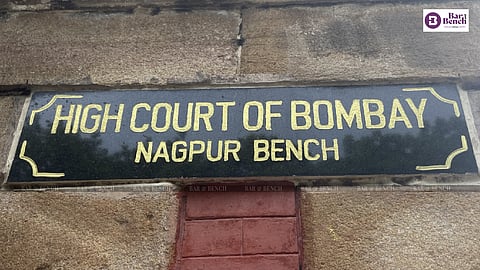
- News
- Columns
- Interviews
- Law Firms
- Apprentice Lawyer
- Legal Jobs
- हिंदी
- ಕನ್ನಡ

The Bombay High Court's Nagpur bench recently ruled that a person merely being present at the scene of a murder and uttering the words "mara mara" (beat her, beat her) does not establish common intention to commit the murder [Jayanand s/o Arjun Dhabale and Ors v State of Maharashtra]
The Bench comprising Justice Vinay Joshi and Justice Abhay Mantri, therefore, acquitted three family members accused of killing of a woman while upholding the conviction of a fourth family member.
The Court stated that the prosecution failed to prove the necessary elements of common intention under Section 34 of the Indian Penal Code (IPC).
This decision came after the Additional Sessions Judge in Pusad had convicted four family members (appellants) for the murder of a woman in 2019.
In its judgment, the High Court observed,
“As discussed above, the mere presence of accused Nos. 2 to 4 on the spot or uttering the words to beat her as ‘mara mara’ does not invoke the ingredients of Section 34 of the IPC to commit her murder.”
The Court further noted that evidence did not reflect prior conspiracy on the part of the three accused to kill the deceased or that they knew about the intention of the convicted killer to murder the deceased.
“On perusal of the evidence on record, it does not reflect that there was a prior concert, nor does the evidence on record denote that accused Nos. 2 to 4 were aware of the fact that accused No. 1-Jayanand had the intention to kill the deceased,” the Court said.
The case stemmed from a brutal murder that took place on May 1, 2015 in Pusad.
The convicted individuals - Jayanand Dhabale, his wife Ashabai and their two sons Niranjan and Kiran - allegedly killed Sunanda, the widow of Jayanand's late brother Vijay.
She had been living with her in-laws after her husband's death. Tensions had been mounting within the family, especially after the Dhabale family accused Sunanda of practicing black magic which they alleged were the cause of their illnesses and misfortune.
On the morning of the attack, Jayanand was found wielding an axe while Sunanda lay gravely injured on the ground. Eyewitnesses testified that Niranjan and Kiran were present at the scene while Ashabai allegedly encouraged the assault by shouting "mara mara" (beat her, beat her).
The prosecution argued that the actions of the family members were part of a coordinated effort to murder Sunanda and they shared a common intention to kill her.
However, the appellants contested this, asserting that there was no prearranged plan or concerted effort to murder Sunanda. They pointed out that Ashabai’s words could have been interpreted as merely encouraging her husband to beat Sunanda, not to kill her. The defense also argued that Niranjan and Kiran were not involved in the planning or execution of the attack.
In its ruling, the Court disagreed with the prosecution’s interpretation of the evidence.
The words 'mara mara' would have been only an exhortation to beat and not kill, the Court said.
“The question is whether uttering the words ‘mara mara’ would constitute an offence punishable under Section 34 of the IPC. The said utterance of the words may have been made only to beat,” the Bench said.
Hence, it concluded that there was no evidence to show that the accused shared a prearranged plan or common intention to commit the murder.
“In the absence of the same [common intention], [Section] 34 of the IPC would not be attracted,” the Court made it clear.
Given the lack of evidence that the accused acted together with a shared intention to murder Sunanda, the Court acquitted Ashabai, Niranjan and Kiran of the charge of murder under Section 302 read with Section 34 of the IPC.
However, the conviction of Jayanand Dhabale and his life sentence were upheld.
Advocate SG Varshani appeared for the appellants.
Additional Public Prosecutor AB Badar appeared for the State.
[Read Judgment]